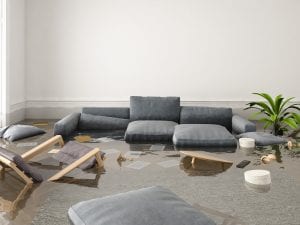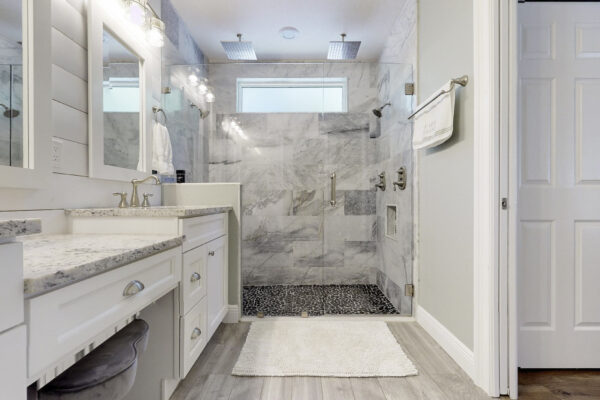Floods can be devastating for a home and for an entire neighborhood. Many regions are susceptible to hurricanes and tropical storms. Your home may be in a high-risk area due to elevation or proximity to a body of water. It’s always best to have a plan for how to care for your home after a flood.
4 Things to Consider After a Home Flood
1. Safety
 Before anything else, make sure you and your family are safe. After a flood, there are several potential sources of danger. Below is a list of some you should be aware of.
Before anything else, make sure you and your family are safe. After a flood, there are several potential sources of danger. Below is a list of some you should be aware of.
- Be careful when entering a flooded house. Structural damage can cause the collapse of walls, floors or the roof.
- Turn off the main water supply to your home.
- Turn off the main breaker and fuses in your fuse box. A flood will usually cause a power outage and you want to avoid dangers such as electrical fires and electrocution when the power is turned on again.
- Don’t drink or shower with the water as flooded water may be contaminated with mold, bacteria or toxic chemicals. You should also protect yourself by wearing rubber boots and gloves when going through flooded areas.
2. Who To Contact
Depending on the circumstances of the home flood, you’ll need to contact several people and service providers.
- Plumber. If water is still entering the house due to a leak or burst pipe, your first call should be to a plumber.
- Insurance Company. You’ll need to call your insurer as soon as possible to have someone assess the damage. Your agent will also give you instructions about documenting any losses and how to proceed with the cleanup.
- Landlord. If you’re renting, call your landlord in case they aren’t aware of the damage.
- Electrician. Call an electrician to inspect everything to make sure it’s safe to restore power.
3. Cleanup and Repairs
Once you’ve made sure everyone is safe and you’ve contacted the correct providers, you can begin the cleanup process.
- Remove Water – Depending on how much water is present, you can use mops, buckets, or a wet vac. If there’s a large amount of water, renting or buying a sump pump may be more efficient.
- Dry It Out – Once it’s safe to use electricity, use large fans, heat, dehumidifiers or air conditioning to dry out your home. If it’s dry outside, open the windows.
- Inspect – Inspect your entire home for damage. Remove any items that can be repaired. If you have valuables that are covered by insurance, be sure to photograph any damage. Use a moisture meter to look for water damage that may not be visible. This can lead to mold and structural problems if not addressed.
- Clean Out – Discard any food or beverages in flooded areas, as it could be contaminated.
4. Be Prepared
While it’s crucial to know how to care for your home after a flood, it’s equally important to make preparations ahead of time, especially for those who live in flood zones in Florida.
- Check your insurance plan and make sure it covers flood damage.
- When traveling, keep valuables in a safe place. Consider shutting off the water supply if you’ll be away for a long period of time.
- Keep important documents in a waterproof case.
- If you’re home when a flood is predicted, stay tuned to news and any evacuation orders.
- If you live in an area prone to flooding, prepare an emergency kit with extra food, bottled war, flashlights, safety gloves, and other essential items.
Hopefully, your home will never be damaged by a flood. However, it’s always best to be prepared and have a plan so you know what to do if it does happen.
Next Steps: Home Rebuild After a Flood
If you are looking for a home builder to help you rebuild your home after a flood, Covenant Homes is a great place to start. As specialists in custom home building on your lot or ours in Pinellas, Pasco, Hernando, and parts of Hillsborough counties, we’re here to support you every step of the way.
While we don’t offer home remodeling or lifting services, we can help you navigate the demolition and rebuilding process with confidence, ensuring you have the knowledge and guidance needed to make the best decision for your future home. If you’re ready to get started – Contact us online to discuss how we can assist you.










